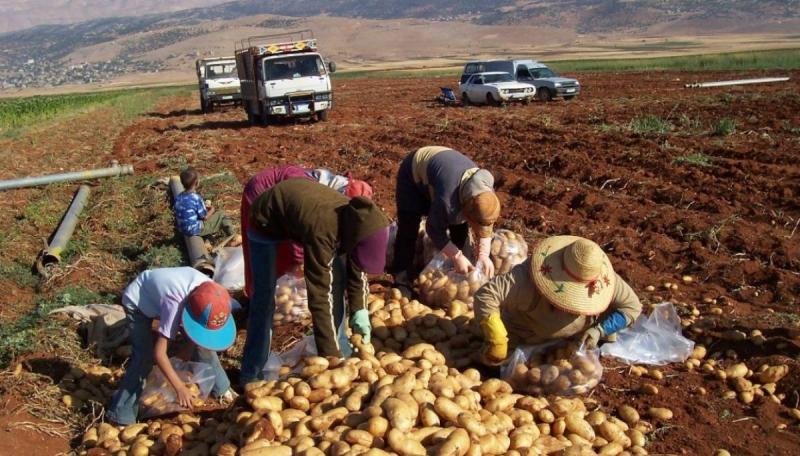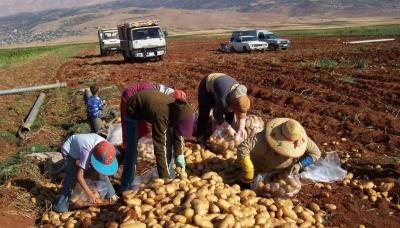At every agricultural juncture, during the peak of the harvest season and the culmination of farmers' efforts, agricultural crises escalate one after another, season after season. While farmers in the Bekaa region have harvested the potato crop, waiting for its sale in the local market, they await external relief, which remains elusive. The crisis of illegal smuggling and the legal crossings being exploited to the full extent have exacerbated the agricultural crises faced by Lebanese farmers, especially dozens in the Bekaa Valley.
During the harvest season, Lebanese farmers are shocked by the invasion of non-Lebanese products into the Lebanese markets via the Syrian border and from within Syria, in large quantities that negatively impact the sale of Lebanese products. This is especially concerning as the export gate is closed, with numerous obstacles and difficulties surrounding the export permits. At the same time, farmers fall victim to outdated trade agreements that have long discriminated against them, signed by ministers and officials who did not approach economic, agricultural, and industrial matters with objectivity.
Najeeb Faris, Vice President of the General Union of Agricultural Unions and President of the Wheat Farmers' Syndicate in Lebanon, called on the Lebanese government through its relevant ministries to address the concerns of potato farmers, particularly in securing the opening of external markets for product sales and preventing the stockpiling of potatoes in warehouses. He emphasized the need to curb the chaos at the borders, where the illegal entry of potatoes, onions, and other agricultural products into Lebanon is rampant, unjustly benefiting from lower production costs. This places farmers at a disadvantage, leading to additional losses as they cannot compete on price, even as they are confident in being able to compete on quality and awareness.
Faris revealed that smuggling operations are conducted in "fresh dollars," which results in a loss for Lebanon in hard currency, as it is withdrawn from traders and sellers for the benefit of those smuggling products from Syria. This contradicts the natural economic cycle that could bring "fresh dollars" into the Lebanese market if export gates were opened and local market protection against agricultural invasion was enhanced. He pointed out that the prices of potatoes, onions, tomatoes, and certain types of vegetables have drastically decreased due to the influx of products through the borders. They await a clear stance from the Minister of Agriculture, the Minister of Economy, and Lebanese customs, along with all relevant agencies.
Faris stressed the importance of creating political and economic climates conducive to facilitating the agricultural cycle and opening land routes with minimal costs to farmers. He focused on the need to amend agreements between Lebanon and foreign countries due to the exceptional situation, where foreign potatoes have entered during the peak of the Akkar potato season, causing significant losses for Akkar farmers. He called for urgent attention and immediate action regarding this agricultural crisis, which affects thousands, to reduce losses and halt the collapse of this vital agricultural sector essential to the lives of Lebanese citizens.
Faris warned of the potential displacement of farmers from the Bekaa to urban areas, abandoning agricultural work, which would inevitably lead to a significant disruption in the national economy. He urged the government and relevant ministries to assume their responsibilities and take action to support the agricultural sector, especially concerning wheat and potatoes. He framed the ongoing delayed promises as a form of displacement policy, which would have negative repercussions for most Lebanese, as potatoes are a staple in the Lebanese diet. The current situation will ultimately lead to a significant decline in the area of land cultivated with potatoes, which will negatively impact their prices domestically. However, if a portion of the production were exported, they could withstand and resist the challenges faced, given all their payments—including for fuel, irrigation, seeds, fertilizers, plowing, labor, and more—are made in fresh dollars.
Faris made an appeal on behalf of potato farmers and other agricultural product growers to the Kingdom of Saudi Arabia, Crown Prince Mohammed bin Salman, and the Saudi ambassador in Lebanon, Walid Bukhari, to "save the season and open the export gates by land and sea to ensure the continuation of agricultural work," as farmers incur substantial costs in dollars, which can only be compensated by exports. He spoke about the quality of Lebanese potatoes, particularly from the Lousi plain, where crops are irrigated with clean groundwater that is not only suitable for irrigation but also for drinking. The land is fertilized primarily with organic fertilizers, making it resistant to fungal diseases present in the soil, able to withstand long transport, and distinctive for frying, such as varieties like Agira, Sababa, Spunta, and Farida, sourced from leading seed companies in the Netherlands.




